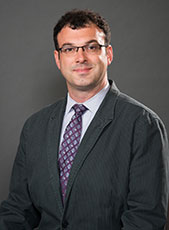IU East assistant professor selected to attend Eurasian migration workshop
Kristoffer Rees, assistant professor of political science, is one of 10 scholars selected to attend the Eurasian Migration 2018 Summer Research Lab at the University of Illinois at Urbana-Champaign (UIUC), June 11-15. The summer workshop is offered through the Russian, East European, and Eurasian Center at UIUC.
Rees applied to the summer workshop and selected from a pool of applicants.
Through the summer workshop, Rees will research his current project, “Transborder Migration on the Kazakhstani-Russian Frontier.”
Rees said based on his research, he found that those who live in cities near the Russian border in northern Kazakhstan often take trips across the border to shop, visit relatives, and other for other activities. Rees said attending the summer workshop would be a foundational step in exploring the extent to which the relatively porous Kazakhstan-Russia border contributes to emergent transborder identities that exist independently of state-centric civic, national, or other forms of official identities.
Rees began his research on Kazakhstan during his dissertation as a graduate student at Indiana University Bloomington. His research continued during summer 2017, when he traveled to the country for fieldwork supported by a Title VIII grant.
“Researching topics like this is especially important because many in the U.S., including those in the policy community, have little to no familiarity with the complexities of the former Soviet region,” Rees said. “Understanding transborder interactions helps us, from a top-down perspective, understand Russia’s foreign policy toward its neighbors, and the extent that Russian foreign policy is dictated unilaterally by Moscow or negotiated among various stakeholders. From a bottom-up perspective, it sheds light on some of the many factors that contribute to how individual political identities are conceived and expressed.”
UIUC describes the Eurasian Migration System as one of the most active global migration networks, including registered and unregistered labor migrants, recognized and unrecognized displaced populations, and victims of trafficking. According to the center, the workshop allows researchers to share their work, pinpoint potential partners for collaboration in the region, gain knowledge of available data and legislation on migration related issues, and participate in hands-on instructional sessions using the latest digital applications and databases for the study of migration in Eurasia.
The workshop is provided by a grant from the U.S. Department of State’s Title VIII Program for Research and Training on Eastern Europe and Eurasia (Independent States of the Former Soviet Union). Through the funding, Rees has additionally received a research stipend.
“At IU East, many of my students remark that the courses they take with me are rewarding because of the depth of international perspective that they offer. The exposure to different political systems and ideologies and different cultural perspectives can be transformative. The research that this project entails will help me make my classes have more accuracy, depth, and nuance.”
Interim Dean of the IU East School of Humanities and Social Sciences TJ Rivard said, “This is not only an amazing opportunity for Kris, it will also serve our students. As Kris points out, this research will create greater depth in his courses. Through Kris’s research, his students will be able to gain a greater understanding of the diverse ways in which people define themselves politically and how circumstances can shift those definitions. As a result, they may have a better understanding of how their own political identities are shaped.”
Rees received his Ph.D. in Political Science and Central Eurasian Studies and his M.A. in Central Eurasian Studies from IU Bloomington. Rees earned his B.A. in Psychology from Whitman College, located in Walla Walla, Washington.
Rees’ research interests include identity politics; interethnic relations, nationalism; language policy and implementation; protests and political movements; multiculturalism and citizenship; and qualitative methods.

